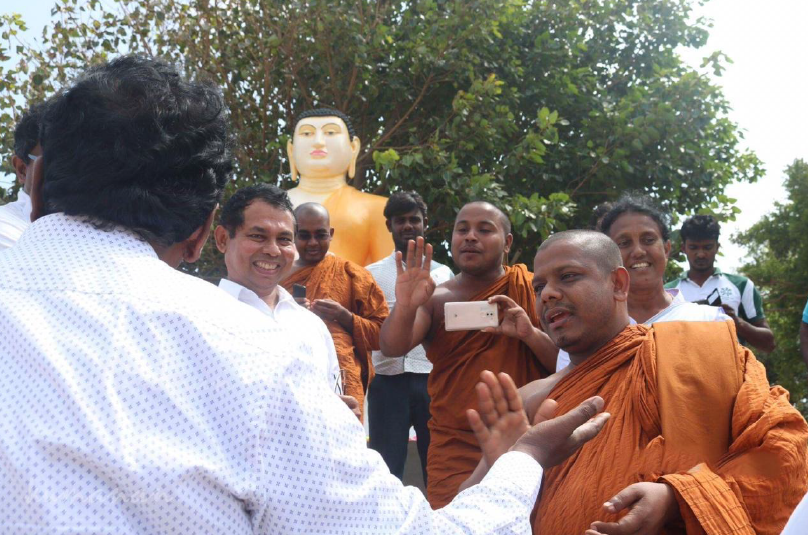FORUM-ASIA member INFORM Human Rights Documentation Centre from Sri Lanka published a report titled ‘Repression of Dissent in Sri Lanka: January – March 2019.’ This report provides some general trends and details some significant incidents related to the repression of dissent in Sri Lanka from 1st January to 31st March 2019. INFORM maintains a running roster of incidents compiled from media reports, social media, incidents reported to INFORM, and the observations and experience of INFORM staff.
In this report, “dissent” is broadly defined to include acts of protest, resistance, defiance, challenge against, or attempt to record rights violations, social injustice at the hands of state or non-state apparatus, including police, armed forces, religious groups, and politicians among others. “Repression” is defined as any attempt by the above state or non-state actors to suppress the above acts of dissent. Any rhetoric decrying human rights has also been considered as repression of dissent because of its potential to erode rights.
INFORM’s previous quarterly report on repression of dissent from October – December 2018 had 28 incidents. Overall, the four quarterly reports in 2018 recorded 103 incidents. This report, covering the first three months of 2019, records details of 35 incidents.
The tone for the year beginning 1st January 2019 appears to have been set by the aftereffects of the constitutional crisis with which 2018 ended. While understanding correlation is not causation, there appears to be an uptick in protests against government actions that may be attributed to general public disappointment over the political class and their neglect of duties.
The Counter Terrorism Act (CTA) presented to Parliament in October of last year led to a mass protest this year by university students calling for it to be struck down. The protest was dispersed with tear gas and water cannon deployment. The CTA is intended to repeal the Prevention of Terrorism Act (PTA) of 1979 which was introduced as a temporary mechanism, but has become a permanent fixture in the country’s criminal justice system. Media freedom groups, NGOs, trade unions, lawyers and rights activists have called for the PTA to be repealed and CTA to be withdrawn, citing many existing laws and provisions in Sri Lanka to deal with terrorism. These groups have condemned provisions in the draft CTA that have broad and vague definitions of what can be considered as terrorism. They further pointed out that such definitions and the possibility of arbitrary interpretations are against democracy, free expression, and rights to assembly, and association.
Out of Sri Lanka’s nine provinces, the Tamil majority Northern Province was where most threats and obstructions to activism were reported, with more than half the incidents in this report having occurred there. The Tamil families of the disappeared and those protesting for the return of their land faced the most adversity in the form of acts meant to intimidate and cease protests. It must be noted that while protests in the north faced intimidations and other subtler forms of threats, protests elsewhere were met with physical adversity in the form of tear gas and water cannons being fired into the protesters. Protests by students, a teachers’ union and those protesting to protect the environment were also attacked by the police.
Tamil journalists in the north also faced substantial threats and barriers to the safe execution of their work related to rights violations and social justice, with seven such incidents being reported. One journalist was physically assaulted by a police officer while others were threatened by either the armed forces or the police. A journalist in the south was also threatened while covering a protest; a short story writer was questioned and later arrested; and a popular tele-drama episode was banned on a state TV channel. In a move threatening to unions and unionizing, a private TV station dismissed some of their employees who had participated in the first ever meeting of a newly formed union.
The 1000 Movement for the increase of tea plantation workers’ wages to 1000 rupees a day has seen mass mobilization this year, and the organizers of the movement have faced resistance from authorities while raising awareness for protests. The President, in what is considered a populist move, granted legal status to the Tripitaka raising fears over potential threats to people’s right to critical expression in relation to religion. Continuing the distressing trend of possible restrictions on rights, the President widely denounced human rights, citing mechanisms in place to ensure human rights as a hindrance, in schools and with regard to criminals. Other institutions verbally attacked by the President included the Constitutional Council, for disregarding his personal recommendation of judges for promotion. In an unprecedented move, the President stated that the Office of Missing Persons (OMP) is catering to the LTTE agenda providing no evidence to support his claim. The OMP was established by a 2016 parliamentary act and operationalized in 2018. The President was also reportedly seeking Cabinet approval for a deal worth billions of rupees for the procurement of surveillance equipment to counter the illegal drug trade. As those who are involved in activism and protests already appear to be targeted by heightened surveillance, INFORM fears that civic engagement and dissent may be further adversely affected by the equipment sought by the President coupled with his continuous verbal assaults on human rights mechanisms.
***
For a PDF version of this report, click here.



